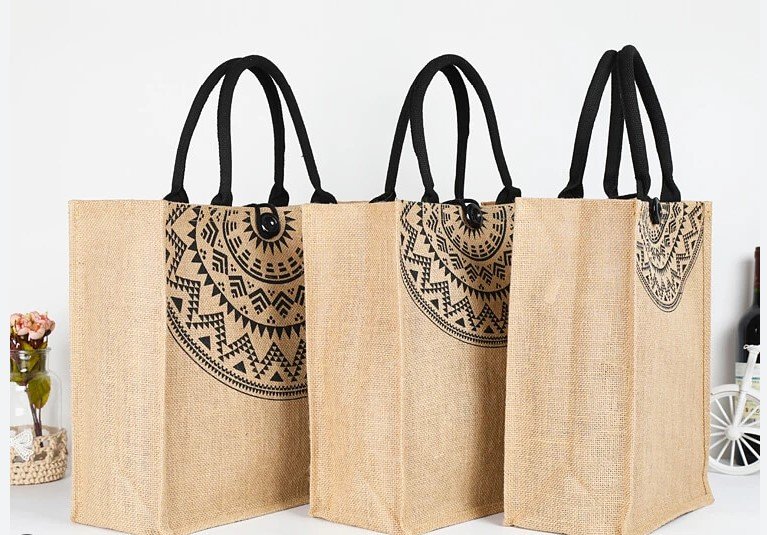Jute Bags as an Eco-Friendly Option
Jute bags as an eco-friendly option are gaining popularity among environmentally conscious consumers. As people increasingly look for sustainable alternatives to plastic, jute bags stand out for their biodegradability, durability, and style. This natural fiber, often called the “golden fiber,” offers many benefits that make it an ideal choice for those seeking to reduce their environmental footprint. By opting for jute bags, consumers contribute to a greener planet and support eco-friendly fashion trends.

Durability and Sustainability of Jute Bags
Jute bags as an eco-friendly option are not only sustainable but also incredibly durable. Jute is a strong, natural fiber that can withstand heavy use, making jute bags ideal for shopping, travel, or daily errands. The durability of jute means that these bags last much longer than their plastic counterparts, reducing the need for frequent replacements. This long-lasting quality helps reduce waste, one of the main goals of the eco-friendly movement. Furthermore, the production of jute requires fewer chemicals and pesticides compared to other crops, making it a much more sustainable option.
In addition, the cultivation of jute has a minimal environmental impact. It grows in tropical climates with plenty of rainfall, so it doesn’t require artificial irrigation. Farmers can also cultivate jute in the same fields as rice, which helps maintain the land’s fertility. Choosing jute bags as an eco-friendly option supports these sustainable agricultural practices.
Jute Bags vs. Plastic Bags
When comparing jute bags as an eco-friendly option to plastic bags, the advantages are clear. Plastic bags contribute significantly to pollution, particularly in oceans, where they harm marine life and take hundreds of years to decompose. On the other hand, jute bags are biodegradable and compostable, meaning they break down naturally without leaving harmful residues behind. Even when jute bags are discarded, they don’t pose the same environmental risks as plastic.
Moreover, plastic bags require fossil fuels for their production, contributing to global warming and environmental degradation. In contrast, jute is a renewable resource that absorbs carbon dioxide from the atmosphere, helping to mitigate climate change. By choosing jute bags over plastic, consumers can actively reduce their carbon footprint and support a more sustainable future.
Versatility and Style in Eco-Friendly Fashion
Jute bags as an eco-friendly option aren’t just functional; they’re also stylish and versatile. Available in a wide range of designs, jute bags can be used for various purposes, from grocery shopping to beach outings or even as everyday accessories. Designers are incorporating creative patterns, bold colors, and different textures into jute bag designs, making them both practical and fashionable.
In addition to their aesthetic appeal, jute bags are highly customizable. Many businesses and organizations use jute bags for branding purposes, adding logos or promotional messages to create a unique, eco-friendly product. This combination of sustainability and personalization makes jute bags a popular choice for events, conferences, and corporate giveaways. As more people become aware of the importance of sustainable fashion, jute bags as an eco-friendly option will continue to grow in popularity.
Supporting Ethical Practices
Choosing sustainable jute bags also means supporting ethical production practices. Many jute bags are produced in developing countries, where jute farming provides a vital source of income for local communities. By purchasing jute bags, consumers contribute to fair trade initiatives that ensure workers are paid fairly for their labor and work in safe conditions.
Additionally, the jute industry helps to empower women, as many women work in jute processing and bag production. These opportunities provide financial independence and improved living conditions for families in rural areas. Therefore, choosing jute bags not only benefits the environment but also supports social sustainability.
Conclusion
In conclusion, jute bags as an eco-friendly option offer a sustainable, durable, and stylish alternative to plastic bags. Their biodegradability, minimal environmental impact, and versatility make them an ideal choice for consumers looking to make a positive difference. Furthermore, the ethical production of jute bags supports fair trade and empowers local communities, making them a socially responsible option. By switching to jute bags, consumers can take a small but meaningful step towards a more sustainable future, reducing waste and promoting eco-friendly fashion.



